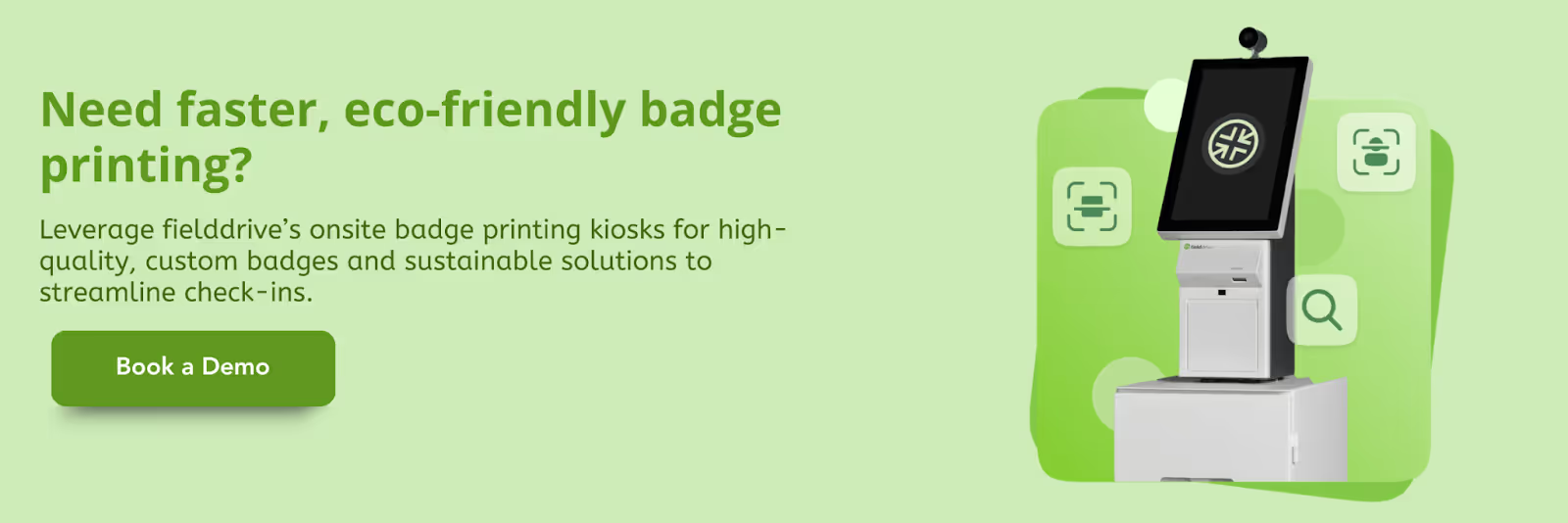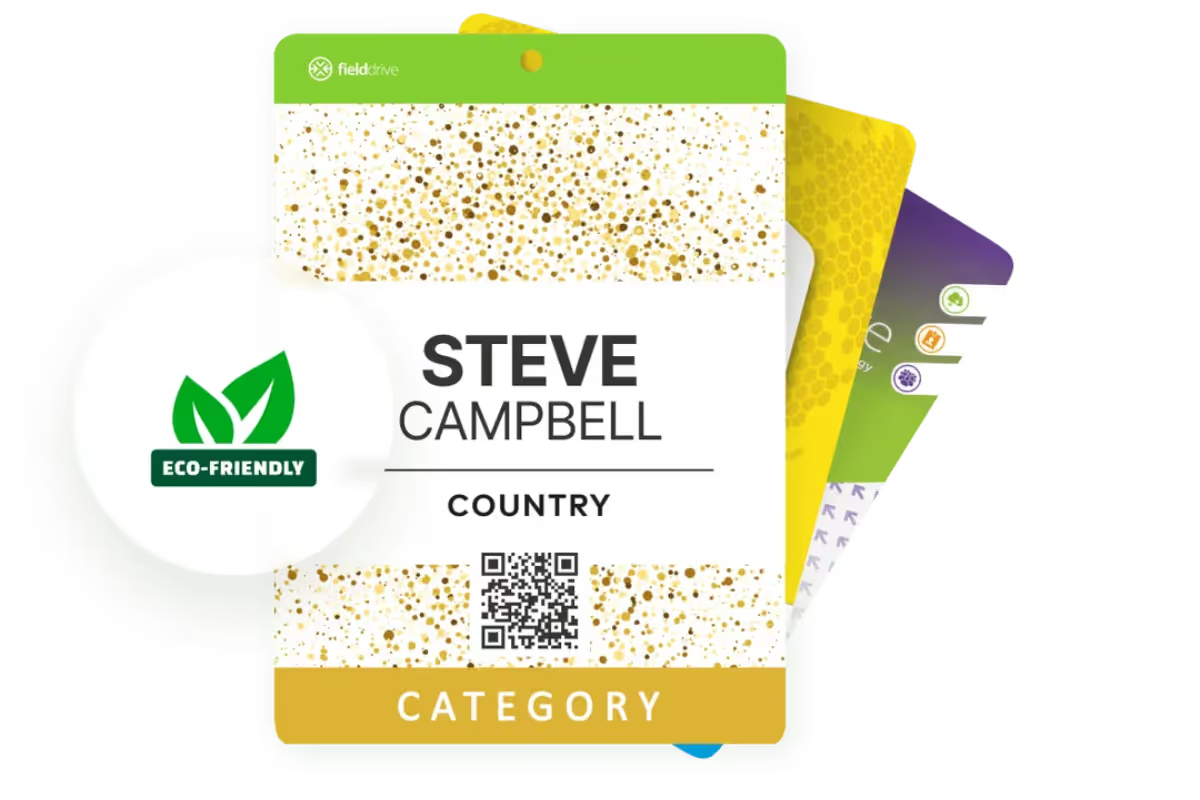15 Great Ideas to Make Your Sustainable Event a BIG HIT
Learn how to host sustainable events with these practical green ideas and tips that reduce environmental impact and create memorable experiences for everyone.

CONTENT
Hosting an event that’s both memorable and sustainable is becoming more important than ever. But many events contribute massively to environmental damage. In fact, a single large event can emit up to 3363 MtCO2e, almost half of what the average U.S. citizen produces in an entire year. If you’re not factoring in sustainability, your event could be leaving a huge carbon footprint.
The challenge for many event organizers is knowing where to start with sustainable practices. With so many moving pieces, making eco-conscious decisions while still delivering a top-notch event can feel overwhelming. But it doesn’t have to be complicated. Small changes can make a big difference.
In this post, we’ll explore 15 actionable ideas to help you reduce your event’s environmental impact, without compromising on quality. Whether you’re unsure where to begin or looking for fresh ideas, we’ve got you covered. Let’s dive in and make your next event a sustainable success!
What are Sustainable Events & How Do They Impact the Environment?
Sustainable events are gatherings designed with the environment in mind. Every aspect of the event is planned to minimize its ecological footprint, from the choice of venue and transportation options to catering and waste management. These events prioritize eco-friendly practices without sacrificing the attendee experience.
The goal is to create an event that meets its objectives while supporting the health of our planet. Here’s how they help:
- Reduce Travel Emissions: Sustainable events can significantly reduce travel carbon emissions by promoting carpooling, public transport, or virtual participation.
- Energy Conservation: Sustainable venues prioritize energy-efficient lighting, heating, and cooling, reducing the event’s energy consumption and overall carbon footprint.
- Eco-friendly Catering: Sustainable events offer locally sourced, plant-based, and organic food options, reducing the environmental impact of food production and transportation.
- Eliminate Single-Use Plastics: Reusable or biodegradable materials replace single-use plastics, reducing waste that ends up in landfills.
- Minimized Event Waste: Sustainable events focus on reducing printed materials, reusing décor, and donating leftover food, ensuring less waste.
By implementing these practices, sustainable events significantly reduce environmental damage while promoting a culture of eco-consciousness in the industry.

15 Green Ideas to Host Sustainable Events
When it comes to hosting an event that truly makes a difference, adopting green, sustainable practices is key. Here, we'll explore practical and impactful green ideas that you can implement to reduce your environmental footprint. So, let’s get started:
1. Choose eco-friendly venues

Selecting a venue with strong environmental credentials is essential for hosting a sustainable event. Look for certifications like LEED or Green Seal that confirm the venue’s commitment to reducing energy and water use, waste management, and overall environmental impact.
These venues often implement sustainable building materials, efficient resource management, and recycling programs. They contribute to a greener event and reinforce your commitment to sustainability, making engaging with your eco-conscious values easier for your attendees.
2. Embrace Virtual and Hybrid Events
On average, a conference attendee generates over four pounds of waste and nearly 400 pounds of CO2 emissions each day, with almost 41% of the waste from typical mid-size trade shows ending up in landfills.
Shifting to virtual or hybrid events can dramatically cut these environmental costs by removing the need for travel. Virtual formats let you connect with a global audience while slashing carbon emissions tied to flights and ground transport.
Hybrid events blend in-person and online participation, lowering overall attendance and emissions while still delivering an engaging live experience. This helps you reduce your event’s footprint without sacrificing reach or impact.
3. Implement Sustainable Transportation
Transportation is a major contributor to an event's environmental footprint. Provide travel incentives such as discounts on transit passes or shuttle services to encourage your attendees to use public transportation, carpool, or ride-share to the event.
If your event spans multiple days, consider partnering with local green transportation providers offering electric buses or bike-sharing programs to help reduce overall emissions.
4. Use Energy-Efficient Tech On-site
Energy consumption at event venues is often high, so integrating energy-efficient technology is vital. Choose LED lighting, efficient heating and cooling systems, and energy-smart audiovisual equipment.
Employing timers and smart sensors can reduce unnecessary power use during downtime. Focusing on energy efficiency on-site directly reduces the carbon footprint related to event operations and sets a sustainability benchmark.
5. Implement Zero-Waste Policies
Zero-waste policies focus exclusively on minimizing landfill contributions by maximizing recycling, composting, and waste reduction. Establish clear waste sorting stations with labeled bins and educate attendees on proper disposal methods.
Partner with waste management vendors experienced in sustainable disposal to ensure maximum diversion from landfills. Zero-waste initiatives keep the spotlight on responsible waste handling and help you meet your sustainability goals.
6. Sustainable Catering and Food Options
When planning your event's catering, choose local, organic, and seasonal ingredients to reduce the carbon footprint associated with food transportation. To further minimize environmental impact, offer a variety of plant-based, vegan, and vegetarian options.
These alternatives generally require fewer resources and produce less waste compared to meat-based dishes. By working with eco-conscious caterers who focus on reducing food waste and packaging, you can create a sustainable dining experience for your attendees.
7. Eco-friendly Marketing and Swag
Marketing materials and event giveaways are often overlooked when it comes to sustainability. Choose recycled or biodegradable paper, and ensure all promotional items are reusable, such as tote bags made from organic cotton.
Select sustainable products like bamboo pens or seed paper, which attendees can later plant. This approach ensures that your marketing efforts align with your sustainability goals.
8. Print Sustainable Badges and On-site Printing

For event badges, opt for eco-friendly materials such as recycled paper, biodegradable plastics, or sustainable wood. Consider using on-demand badge printing solutions like fielddrive to avoid overproduction and unnecessary waste.
Digital badges are also a great alternative. They allow attendees to check in through apps or email, eliminating physical materials. Printing badges on-site as needed reduces waste and ensures that you’re using only the materials required for each event.
9. Provide Digital Take-Home Resources
Instead of handing out physical resources, consider providing take-home resources in digital formats. Offer attendees access to downloadable content via event apps or email. This could include session slides, presentation notes, and even event-related videos.
For those who prefer something tangible, consider eco-friendly alternatives like sustainable notebooks or reusable bags. Providing digital or minimal resources helps reduce waste while still delivering value to your audience.
10. Measure Your Carbon Footprint
Measuring your event's carbon footprint is essential in understanding its environmental impact. Use carbon calculators to assess emissions from travel, energy use, waste, and other factors. Once you have a clearer picture of your carbon output, implement strategies to offset it, whether by supporting carbon offset projects or investing in renewable energy initiatives.
Tracking and offsetting the carbon footprint shows your commitment to sustainability and helps attendees see how they can contribute to a greener future.
11. Set up Reusable Water Stations

Single-use plastic bottles contribute massively to event waste. To reduce this impact, set up reusable water stations where attendees can refill their bottles throughout the venue. You can provide attendees with reusable water bottles upon registration or encourage them to bring their own.
This approach reduces plastic waste and saves on the costs associated with buying bottled water. By making water easily accessible and promoting the use of reusable bottles, you’re helping reduce your event’s overall environmental footprint.
12. Eco-friendly Clean-up
Post-event clean-up is just as important as the preparation. Instead of using traditional waste disposal methods, adopt an eco-friendly approach by implementing recycling and composting programs even after your event is over.
Work with green event services that prioritize responsible disposal methods. Consider donating leftover materials or items that can be reused, such as event décor or materials, to local charities.
13. Promote Local and Artisan Goods
Instead of purchasing mass-produced giveaways, choose to support local artisans and small businesses. Offering locally made products as event swag reduces the carbon footprint associated with production and shipping, promotes local economies, and fosters a sense of community.
Items like handmade goods, local food products, or artisanal crafts serve as unique souvenirs and resonate with attendees who value supporting sustainable practices.
14. Ditch Single-use Plastics
Single-use plastics, such as straws, utensils, and plastic cups, are major contributors to event waste. In fact, the average stadium hosting 300 events a year uses 5.4 million single-use cups, creating a staggering 63.75 tons of waste.
To combat this, swap these items for more sustainable alternatives. Consider using compostable or bamboo-based options or reusable alternatives like metal cutlery, plates, and cups. If disposable items are necessary, choose biodegradable ones and ensure they can be composted or recycled.
Eliminating single-use plastics significantly reduces the amount of waste generated, contributing to a cleaner, more sustainable event experience.
15. Choose Green Sponsors
Choosing sponsors who align with your sustainability goals helps amplify your green message and creates a more eco-conscious event. When selecting sponsors, prioritize companies that are committed to environmentally friendly practices, such as using sustainable materials, reducing emissions, or offering eco-friendly products and services.
Partnering with green sponsors supports your sustainability efforts and sends a strong message to attendees about the importance of responsible corporate practices. These partnerships help create a more cohesive, impactful, and socially responsible event.
Finally, here are a few extra tips to further your sustainability efforts.
6 Amazing Tips for Sustainable Events
When it comes to hosting sustainable events, every little change counts. Beyond the big decisions, small adjustments can have a significant impact. Here are a few additional tips to help reduce your event's environmental footprint:
- Encourage Attendees to Turn Off Their Cameras: Turning off webcams during virtual sessions can save up to 96% of an attendee's carbon footprint, according to MIT.
- Delete Unnecessary Files: Remind attendees to delete files and emails after the event to reduce digital clutter and storage needs.
- Opt for SD Video Streaming: Encourage attendees to watch content in SD rather than HD to reduce energy consumption.
- Compress Media Files: Ensure all video and image files are compressed before sharing to minimize data transfer and energy use.
- Promote Text-Based Communication: Text-based chat is more energy-efficient than video calls and reduces data usage.
- Switch to Digital Check-Ins: Use digital platforms for quicker, paperless check-ins, reducing waste and wait times.

With fielddrive’s digital check-ins, facial recognition, and digital branding kiosks, you can enhance both the attendee experience and your event's eco-friendly efforts. Request a demo today and take your sustainability to the next level!
How Does fielddrive Help You Run More Sustainable Events?
Creating a sustainable event requires meticulous planning and a commitment to making environmentally conscious choices at every stage. By adopting green practices early on and conducting thorough research, you set the foundation for an event that not only meets its goals but also positively impacts the planet.
fielddrive is here to support you in these efforts, offering robust tools that make running a sustainable event easier and more efficient. By integrating cutting-edge technology, fielddrive makes it easy to create an efficient and eco-friendly event. Here’s how fielddrive can help you go green:
- Touchless Check-In: Reduce paper waste and speed up entry with touchless check-in solutions, ensuring a smooth and sanitary process for all attendees.
- Facial Recognition: Enhance security and efficiency with facial recognition technology, eliminating the need for paper tickets and minimizing waste.
- Instant Badge Printing: Cut down on unnecessary printing and waste with instant badge printing, providing only what’s needed onsite and reducing surplus materials.
- Sustainable Badges: Opt for eco-friendly, sustainable badges that align with your commitment to reducing plastic waste.
Partner with fielddrive and take the first step toward hosting events that truly make a difference. Request a free demo today.
Frequently Asked Questions
1. What is the meaning of sustainable events?
Sustainable events focus on minimizing environmental impact by using eco-friendly practices such as reducing waste, conserving resources, and lowering carbon emissions.
2. What are sustainable activities?
Sustainable activities are actions that help reduce environmental damage, such as recycling, using renewable energy, and supporting eco-friendly transportation and materials.
3. How can events be sustainable?
Events can be sustainable by choosing eco-friendly venues, reducing waste, promoting green transportation, offering sustainable catering options, and using digital resources instead of paper.
4. What are the 3 pillars of sustainability?
The three pillars of sustainability are environmental, economic, and social. They focus on eco-friendly practices, long-term economic viability, and community well-being.
5. What are the 3 C's of sustainability?
The 3 C’s of sustainability are Conservation, Collaboration, and Communication, which encourage conserving resources, working together for sustainable solutions, and sharing eco-friendly initiatives.
Want to learn how fielddrive can help you elevate your events?
Book a call with our experts today



.png)
.svg)
.svg)
.svg)

.svg)